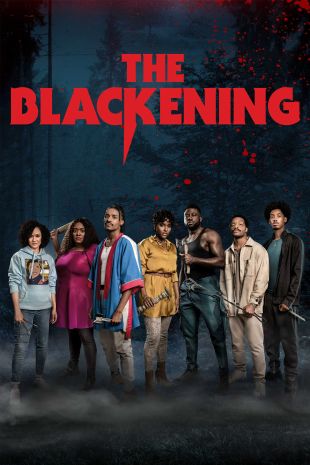
A really great parody should achieve more than simply mimicking its source material. The best parodies dissect their sources in such a way that they bring to light legitimate issues within a genre that need to be addressed. The Blackening, while delivering its jokes with razor-sharp wit and precision-comedic timing, falls just short of such an achievement.
Directed by Tim Story (Barbershop), The Blackening focuses on a complaint often lodged against the horror genre. Namely, the film takes aim at the common perception that Black horror characters often die first. When a group of Black friends discover a mysterious board game with a cartoonishly racist figure at its center, they're charged with deciding which of them is the Blackest. Whoever's chosen will have to give up their life.

For a film that largely presents itself as just another goofball parody in the vein of the Scary Movie franchise, this premise actually raises some fairly deep moral and ethical dilemmas. The easiest way for the friends to survive is to violate their own racial identity. One friend in particular, Clifton (Jermaine Fowler), embraces this concept all too readily. For others, however, the resultant identity crisis makes for a thoughtful and engaging conflict.
Predictably, The Blackening's premise leads to a heavier focus on dialogue than typically seen in other films of its kind. The movie leans particularly hard on pop culture references, a rather bold choice considering the potential to isolate viewers who aren't in on the joke. While the punchlines are funny enough, the movie's assumption that any true Black viewer should be in on every reference feels dangerously risky, as the movie more or less questions the legitimacy of any viewer within the Black community who doesn't know specific facts about The Fresh Prince of Bel-Air.

These risks aside, the dialogue at least flows naturally for the most part. The rapport between the characters rarely feels forced, and the nuances within their relationships add enough flavor to keep things interesting. For instance, Lisa's (Antoinette Robertson) continued association with her cheating boyfriend Nnamdi (Sinqua Walls) has a clear impact on Dewayne's (Dewayne Perkins) respect for both of them. Perkins, who wrote the original short sketch on which the film was based, unsurprisingly feels most at home in his role. However, the characters of Allison (Grace Byers) and Shanika (X Mayo) will inevitably steal the show for some viewers on the strength of their dialogue and performances.
While The Blackening's merits as a comedy are certainly stronger in some places than others, the same can't really be said for its strengths as a horror film. Some kills are delivered well, but the horror aspects are largely subpar and potentially too in line with the genre that it's trying to satirize. Although this is a common problem among parodies in general, it feels especially disappointing here. The most egregious offender is the film's woefully predictable ending.
The comedy isn't free from the constraints of predictability either. The film's core premise is based on a joke that, no pun intended, has already been done to death. Moreover, some of the political references feel like fairly low-hanging fruit. Even Diedrich Bader's very welcome appearance in the film becomes an eye roller the moment his name is given as Officer White.
The Blackening has some decent things to say, and it says them well for the most part. Story and Perkins deserve credit for breathing new life into old jokes. Unfortunately, those jokes still suffer a general lack of freshness and relevance that might have elevated the film into something better. With little to praise in the way of production value, The Blackening relies heavily on the strength of its dialogue to provide a quality experience. Although enjoyable enough for a single viewing, the film simply never explores its potential enough to be something more.
